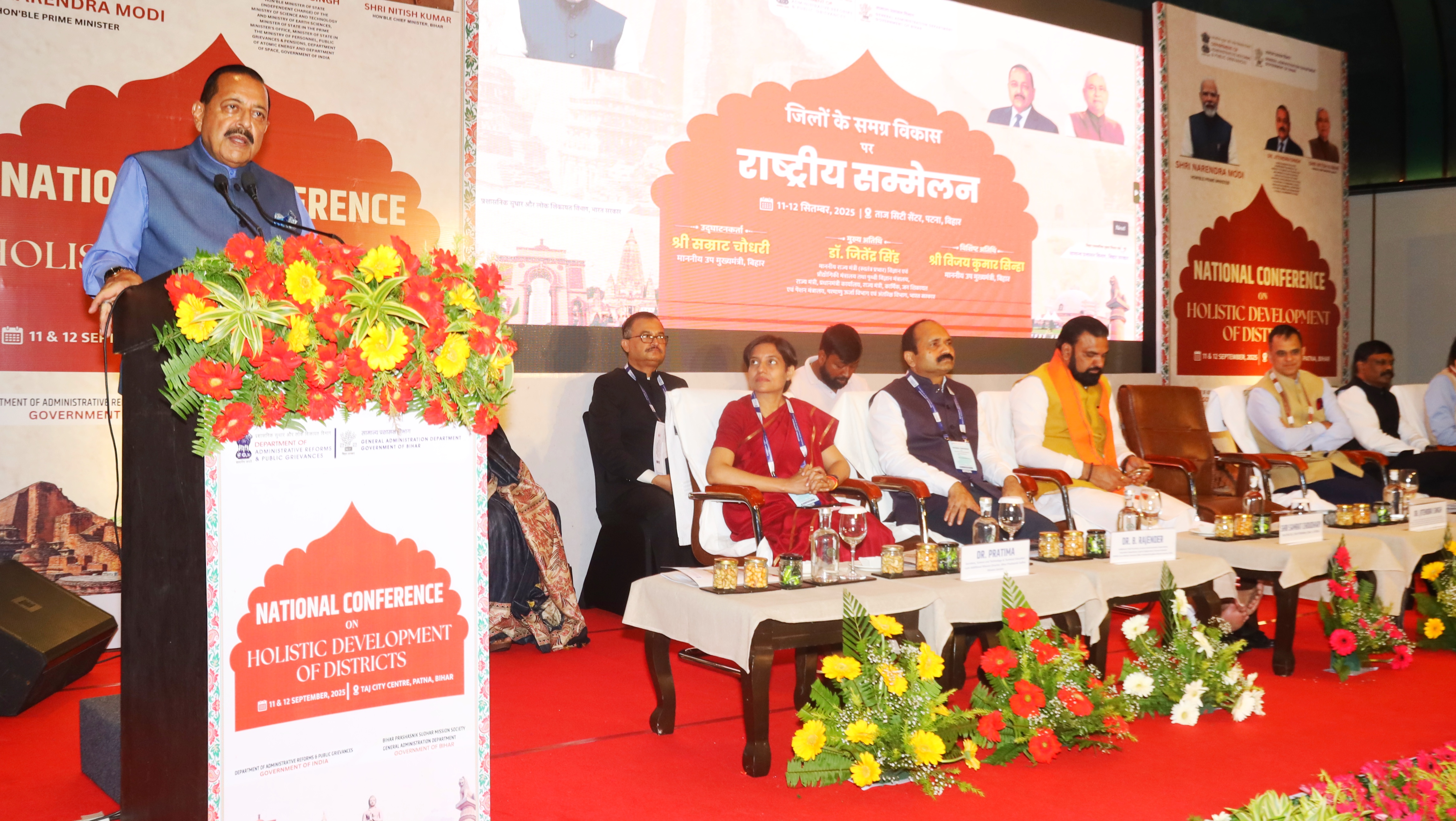Ministry of Personnel, Public Grievances & Pensions
'Aspirational District' Model Replaces 'Backward District' Nomenclature: Dr. Jitendra Singh
Two-Day National Conference on 'Holistic Development of Districts' Begins in Patna
Patna's Legacy of Good Governance Offers Inspiration and Challenge to Meet Rising Public Expectations
India's Good Governance Practices Earning Global Recognition: Dr. Jitendra Singh
Posted On:
11 SEP 2025 5:11PM by PIB Patna
Dr. Jitendra Singh, Union Minister of State for Personnel, Public Grievances, and Pensions MoS (Independent Charge) for Science & Technology; Earth Sciences; Minister of State PMO, Personnel, Public Grievances, Pensions, Atomic Energy and Space, Dr. Jitendra Singh, today inaugurated the 2-day National Conference on “Holistic Development of Districts”, organized by the Department of Administrative Reforms and Public Grievances (DARPG) in collaboration with the Government of Bihar.
Lauding the Aspirational District model introduced by the Modi Government replacing the backward district, the Minister said, "The Aspirational District model is not about backwardness; it is about competitiveness and convergence. Districts are ranked through real-time monitoring, scientific benchmarks, and a participatory, citizen-centric approach."

The conference aims to exchange innovative governance practices, enhance officer-to-officer learning, and promote citizen-centric development across India. Bihar Deputy Chief Minister Samrat Chaudhary also joined the deliberations.
Addressing the gathering, Dr. Jitendra Singh praised Bihar’s steady progress, resilience, and economic growth, especially in the post-Jharkhand era, when the state lost both mineral resources and cadre strength. He credited the state government under Chief Minister Nitish Kumar for effective collaboration with the Centre and hailed Patna’s rich legacy of good governance—from the days of Pataliputra and Samrat Ashok To modern democratic institutions—as both an inspiration and a challenge to meet citizens’ rising expectations.
Highlighting Prime Minister Narendra Modi’s vision of “Maximum Governance, Minimum Government”, Dr. Jitendra Singh emphasized the Aspirational Districts Programme, which has replaced the outdated term “Backward Districts” with a more positive, prestige-oriented, and aspirational identity.
“The Aspirational Districts model is not about backwardness; it is about competitiveness and convergence. Districts are ranked through real-time monitoring, scientific benchmarks, and a participatory, citizen-centric approach,” he said.
He explained that this model has transformed mindsets among administrators and citizens alike, turning governance into a dynamic, competitive mechanism.
Dr. Singh outlined the five guiding pillars for holistic district development, emphasizing that progress must be comprehensive and inclusive. He said that development should begin with the saturation of government schemes to the last mile, ensuring benefits reach every eligible citizen. This must be supported through convergence of efforts by the Centre, State, and Panchayati Raj Institutions, creating a seamless framework for delivery. Equally important is the active participation of all stakeholders, including citizens, to make governance truly people-centric.
Dr. Jitendra Singh also highlighted the need for innovation in governance to address local challenges and stressed that successful models should be replicated across districts, thereby fostering a culture of sustainable and inclusive growth nationwide.

He shared examples of officers devising innovative, citizen-driven solutions, such as ensuring timely Ujjwala gas cylinder delivery in flood-prone areas through local panchayat coordination.
The Minister highlighted that India’s governance reforms have drawn international attention, citing Madagascar’s request to adopt CPGRAMS (Centralized Public Grievance Redress and Monitoring System) and the Digital Life Certificate model.
Other key reforms showcased included the elimination of 1,600 obsolete laws to reduce red tape, along with a paradigm shift from rule-based to role-based functioning through Mission Karmayogi. The introduction of the Swamitva Scheme and digital governance models has further promoted transparency, efficiency, and accessibility in service delivery. Additionally, special cleanliness and disposal campaigns generated over ₹1,200 crore from e-waste recycling, reflecting the tangible socio-economic impact of governance reforms.
Dr. Jitendra Singh explained the rationale of holding regional-level national conferences in places such as Ladakh, Itanagar, Bhubaneswar, and Mumbai, ensuring inclusivity and exposure for officers nationwide. This approach has expanded ownership of governance reforms beyond Delhi-centric platforms.
The Minister congratulated Bihar for adopting 238 online services, the Right to Public Services Act, Lok Seva Kendras, and Panchayat Sarkar Bhawans, which exemplify citizen-first governance. He also noted that DARPG has initiated state-level collaborations with financial support of ₹15–15.5 crore, with Bihar as a partner.

Concluding his address, Dr. Jitendra Singh underlined that the path to Viksit Bharat lies in the spirit of whole-of-government and whole-of-nation, where governance innovations translate into tangible socio-economic development for every citizen.
****
Kumar Saurabh / Mohit Kumar Pandey
(Release ID: 2165720)
Visitor Counter : 297